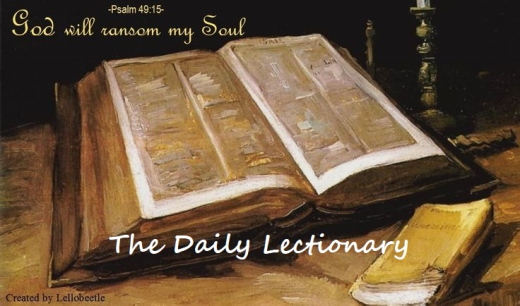The Daily Lectionary
FRIDAY, October 4, 2019
(Revised Common Lectionary Year C)
(Semi-continuous Reading Plan)
Lamentations 3:19-26
19 The thought of my affliction and my homelessness
is wormwood and gall!
20 My soul continually thinks of it
and is bowed down within me.
21 But this I call to mind,
and therefore I have hope:
22 The steadfast love of the Lord never ceases,
his mercies never come to an end;
23 they are new every morning;
great is your faithfulness.
24 “The Lord is my portion,” says my soul,
“therefore I will hope in him.”
25 The Lord is good to those who wait for him,
to the soul that seeks him.
26 It is good that one should wait quietly
for the salvation of the Lord.
Jeremiah 52:12-30
52:12 In the fifth month, on the tenth day of the month—which was the nineteenth year of King Nebuchadrezzar, king of Babylon—Nebuzaradan the captain of the bodyguard who served the king of Babylon, entered Jerusalem. 13 He burned the house of the Lord, the king’s house, and all the houses of Jerusalem; every great house he burned down. 14 All the army of the Chaldeans, who were with the captain of the guard, broke down all the walls around Jerusalem. 15 Nebuzaradan the captain of the guard carried into exile some of the poorest of the people and the rest of the people who were left in the city and the deserters who had defected to the king of Babylon, together with the rest of the artisans. 16 But Nebuzaradan the captain of the guard left some of the poorest people of the land to be vinedressers and tillers of the soil.
17 The pillars of bronze that were in the house of the Lord, and the stands and the bronze sea that were in the house of the Lord, the Chaldeans broke in pieces, and carried all the bronze to Babylon. 18 They took away the pots, the shovels, the snuffers, the basins, the ladles, and all the vessels of bronze used in the temple service. 19 The captain of the guard took away the small bowls also, the firepans, the basins, the pots, the lampstands, the ladles, and the bowls for libation, both those of gold and those of silver. 20 As for the two pillars, the one sea, the twelve bronze bulls that were under the sea, and the stands, which King Solomon had made for the house of the Lord, the bronze of all these vessels was beyond weighing. 21 As for the pillars, the height of the one pillar was eighteen cubits, its circumference was twelve cubits; it was hollow and its thickness was four fingers. 22 Upon it was a capital of bronze; the height of the capital was five cubits; latticework and pomegranates, all of bronze, encircled the top of the capital. And the second pillar had the same, with pomegranates. 23 There were ninety-six pomegranates on the sides; all the pomegranates encircling the latticework numbered one hundred.
24 The captain of the guard took the chief priest Seraiah, the second priest Zephaniah, and the three guardians of the threshold; 25 and from the city he took an officer who had been in command of the soldiers, and seven men of the king’s council who were found in the city; the secretary of the commander of the army who mustered the people of the land; and sixty men of the people of the land who were found inside the city. 26 Then Nebuzaradan the captain of the guard took them, and brought them to the king of Babylon at Riblah. 27 And the king of Babylon struck them down, and put them to death at Riblah in the land of Hamath. So Judah went into exile out of its land.
28 This is the number of the people whom Nebuchadrezzar took into exile: in the seventh year, three thousand twenty-three Judeans; 29 in the eighteenth year of Nebuchadrezzar he took into exile from Jerusalem eight hundred thirty-two persons; 30 in the twenty-third year of Nebuchadrezzar, Nebuzaradan the captain of the guard took into exile of the Judeans seven hundred forty-five persons; all the persons were four thousand six hundred.
Revelation 2:12-29
The Message to Pergamum
2:12 “And to the angel of the church in Pergamum write: These are the words of him who has the sharp two-edged sword:
13 “I know where you are living, where Satan’s throne is. Yet you are holding fast to my name, and you did not deny your faith in me even in the days of Antipas my witness, my faithful one, who was killed among you, where Satan lives. 14 But I have a few things against you: you have some there who hold to the teaching of Balaam, who taught Balak to put a stumbling block before the people of Israel, so that they would eat food sacrificed to idols and practice fornication. 15 So you also have some who hold to the teaching of the Nicolaitans. 16 Repent then. If not, I will come to you soon and make war against them with the sword of my mouth. 17 Let anyone who has an ear listen to what the Spirit is saying to the churches. To everyone who conquers I will give some of the hidden manna, and I will give a white stone, and on the white stone is written a new name that no one knows except the one who receives it.
The Message to Thyatira
18 “And to the angel of the church in Thyatira write: These are the words of the Son of God, who has eyes like a flame of fire, and whose feet are like burnished bronze:
19 “I know your works—your love, faith, service, and patient endurance. I know that your last works are greater than the first. 20 But I have this against you: you tolerate that woman Jezebel, who calls herself a prophet and is teaching and beguiling my servants to practice fornication and to eat food sacrificed to idols. 21 I gave her time to repent, but she refuses to repent of her fornication. 22 Beware, I am throwing her on a bed, and those who commit adultery with her I am throwing into great distress, unless they repent of her doings; 23 and I will strike her children dead. And all the churches will know that I am the one who searches minds and hearts, and I will give to each of you as your works deserve. 24 But to the rest of you in Thyatira, who do not hold this teaching, who have not learned what some call ‘the deep things of Satan,’ to you I say, I do not lay on you any other burden; 25 only hold fast to what you have until I come. 26 To everyone who conquers and continues to do my works to the end,
I will give authority over the nations;
27 to rule them with an iron rod,
as when clay pots are shattered—
28 even as I also received authority from my Father. To the one who conquers I will also give the morning star. 29 Let anyone who has an ear listen to what the Spirit is saying to the churches.
Optional parts of the readings are set off in [square brackets.]
The Bible texts of the Old Testament, Epistle and Gospel lessons are from the New Revised Standard Version Bible, copyright 1989 by the Division of Christian Education of the National Council of the Church of Christ in the USA, and used by permission.
The Daily Lectionary is a three year cyclical lectionary. We are currently in Year C. Beginning with the first Sunday of Advent in 2019, we will be in Year A. The year which ended at Advent 2018 was Year B. These readings complement the Sunday and festival readings: Thursday through Saturday readings help prepare the reader for the Sunday ahead; Monday through Wednesday readings help the reader reflect and digest on what they heard in worship. Revised Common Lectionary Daily Readings, copyright © 2005 Consultation on Common Texts. www.commontexts.org
The Daily Lectionary
Lamentations 3:19-26; Jeremiah 52:12-30; Revelation 2:12-29









